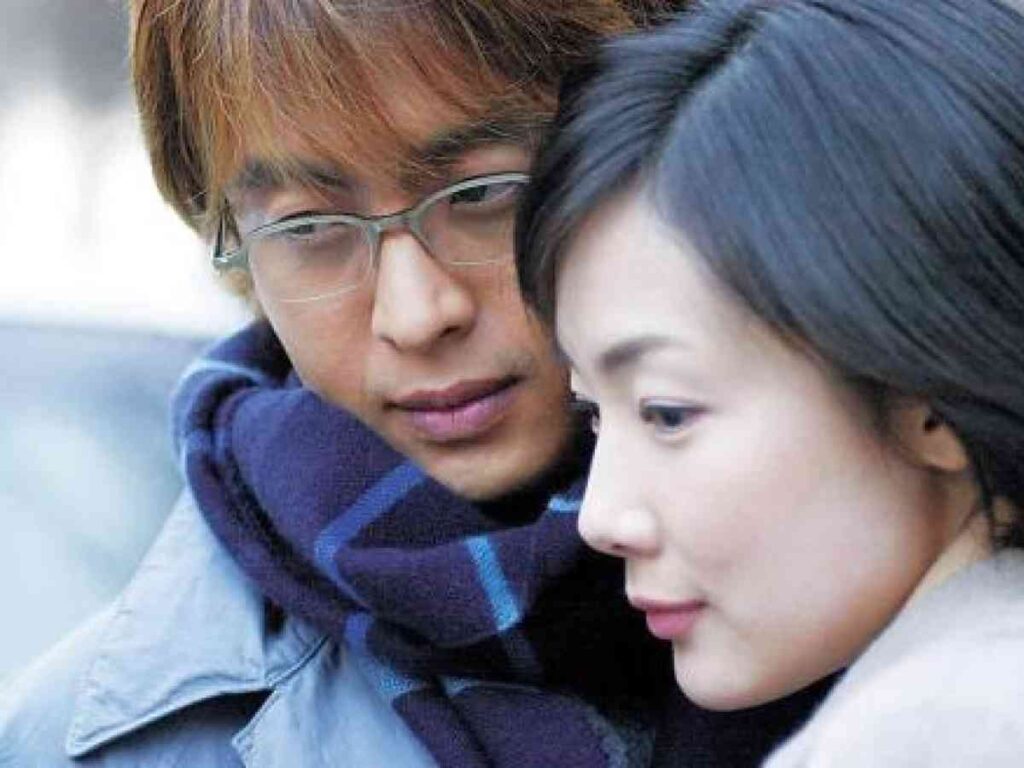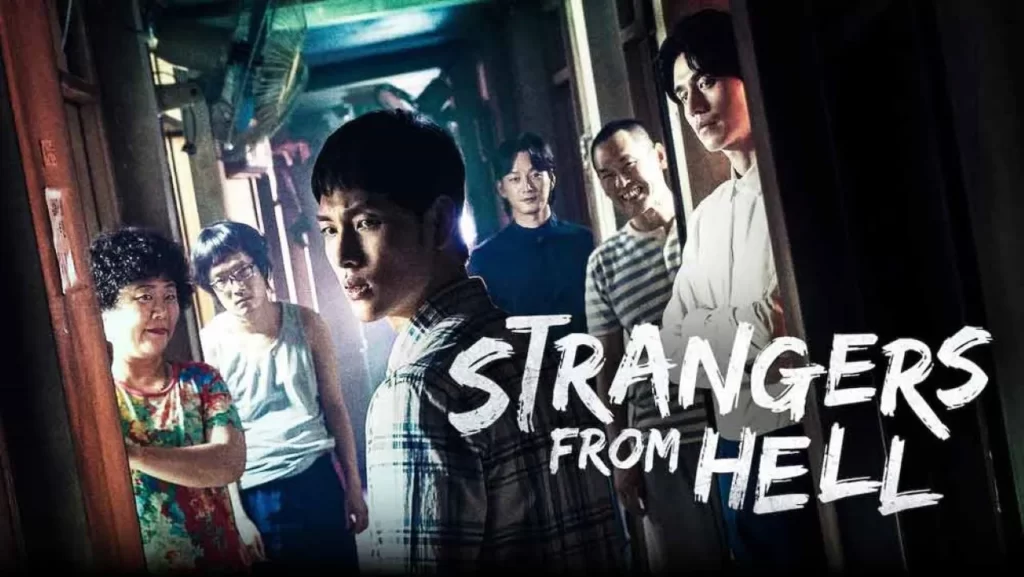The first time I watched a drama, it was impossible for me to remember the names of the characters (the first names of the actors I do not even talk about). Thus, my girlfriend and I called them "The handsome kid", "She", "The bitch" and "The other". We quickly realized that these series, in addition to having in common the year 2000 cut, seemed structured on the same layer. As if it were a carcass that was stuffed with different stories, all supported by melancholic and beautiful soundtracks.
I, who was used to the world of Bollywood, felt quite comfortable. These innocent and pure series, intended to be watched with the family, suited me perfectly. Even if this reminder of Mexican "telenovela" was still quite present, the series ended after sixteen episodes, preventing us from falling into an endless spiral. Not everyone slept with everyone and the scenarios were thoughtful. Superficiality was just a red herring because most dramas dealt with very deep subjects.

The typical Asian interaction took place very quickly and we inevitably identified with one of the characters. We cried in front of "A love to kill " (2007), with an almost brand new Bi Rain and " Winter Sonata" (2002), with Bae Yong-Joon and her hairstyle (and the microphone that sometimes protruded from the camera!). We laughed with " My Name Is Kim Sam-soon " (2005) and understood – it was official – that the nickname "Handsome kid" was attributed to the protagonists of each drama.
We had to look for the rest in every corner of the Internet, resolve to see them sometimes without subtitles, with the hope that someone would want to translate them. A circle knitted little by little but firmly around a common passion. Fansubs appeared.
Far from the catastrophic Google translations of Indian copies, new fans were giving us very good subtitles. It was an almost unbearable wait, a drug. Television no longer existed. American cinema and its actors had become memories hidden at the bottom of a drawer. We started to get acquainted with South Korean culture, its history, its language. We listened to "Bigbang" and "2NE1" before the whole planet started dancing to Psy's hit. No need for notes during the episode to translate what "Yah! ", "Aish", or "Hyung" meant. Umma… with the tone that goes with it.

"Coffee Prince" (2007) with Gong Yoo and his dimples. "I love you, whether you're a man, a woman, or an alien." The subject of homosexuality, very delicate at the time, timidly pointed its nose. " Gong " (2006). But what did we suffer with this drama! And how young was Ju Ji-Hoon! They were all so… Beautiful, impeccable, sublime!!!!! And the scenarios so gripping!
The 2000s saw magical dramas. " Boys over flowers " (2009) with Lee Min-ho and his frisettes that did not move a hair (Lee Min-ho's hair never moves a hair…) and Kim Hyun-Joong, and that kind of milky light emanating from her, " Sorry, I Love You " (2004) with So Ji-Sub and her hair completely exploded. He must have been traumatized because since then, not a single hair of his head seems to be lost (or anything).

2010: the 4/3 format disappeared and in " Secret Garden " by the formidable author Kim Eun-Sook (The Glory 2023, currently on Netflix, The King: Eternal Monarch 2020, Goblin 2016-2017, Descendants of the Sun 2016, The Heirs 2013, Gentleman's Dignity 2012), the character of Hyun Bin dares to disobey his mother and marries the poor stunt mermaid who refuses to disappear. Not only are the precepts of filial love overcome, but it is also the beginning of the revolution. A tacit open-mindedness seems to be slowly creeping in. Or is it rather an opening to a planet that has its eyes more and more focused on the films and dramas of this small peninsula?

The success and enthusiasm that these series have caused around the world, begin to take on an unexpected significance. The image quality changes. The scenery, sometimes even the country. Dramatic endings are rare. No more question that the main actress dies of eye cancer (after millions of adventures so that "The handsome kid" and "Elle" meet) or that the main actor commits suicide to give his heart to his sister. No more falling in love with your sick sister (and letting her die for long episodes).
Cable channels are letting go. With our eyes, we look for the logo of the channel to know if there will be more than a kiss. Because that's all well and good, but a little bit of debauchery doesn't hurt anyone. By holding hands and looking into each other's eyes, it ends up creating frustration. Not to mention the credible side of the thing… We want more.
Thus, as Song Joong-Ki's character says in his latest drama " Reborn Rich ", "One day the world will watch movies and series over the Internet. One day, a Korean film will win Oscars and a South Korean group will be successful all over the world." But, from 2010, dramas experienced a certain gap between the dramas in question and what was expected of them. The desire for official recognition from around the world slightly neglected the depth of the scenarios. Sloppy endings, stories that drag on… For a while, we had to look for the drama at the height of what we already knew.

It must also be said that with all these new cable channels, the choice was difficult, but, nevertheless, the first eight years of this decade have graced us with the brilliant "It's okay that's love " (2014) which strives to prove the psychological problems of each of us and which offers us a soundtrack of extreme quality, the dark " Fashion King " (2012), with the charismatic Yo Ah-In and Lee Je-Hoon and the sublime " Empress Ki ". We took his episodes intravenously. " The King 2hearts " (2012), " Healer " (2014), " Six Flying Dragons " (2016) and many more!
The year 2016 has become decisive for the world of Korean dramas. China blocks the import of South Korean dramas because of US forces deployed in South Korea, to thwart North Korea's threats (again and again…). It is absolutely necessary to face the facts, the enormous losses that this unofficial ban causes are alarming. But South Korea is a country that always ends up falling back on its feet. On the one hand, it can no longer export its culture, namely, its dramas, its music, its webtoons or its video games. From 2015 until the year 2021 when the film " Oh! My Gran " was screened, China had blocked any cultural expression coming from the land of the morning calm.
On the other hand, Netflix, and the whole planet at the same time, taunts China without knowing it. The platform announces 130 South Korean programs developed since 2016. Thousands of light years away from that time when fans spent their time looking for the next episode of a new series, the streaming giant began to offer us our beloved dramas. It was almost too easy!

And then, 2019, a pandemic, "THE" pandemic forces us to stay in lockdown. Series more echoing the films that South Korea offered us well before the twenty-first century, are emerging. With a very strong penchant for the other side of the force, new dramas, and not only on Netflix, evolve, denounce, mark their desire to improve, again and again. " Strangers from hell " (2019), " Kingdom (2019)", Extracurricular (2020), all these dramas show, in an almost obstinate way, an assurance and determination that the early 2000s had not known.
An abominable and frightening doll hypnotizes the entire planet with her robotic song. We are past 2020. Not only does it kill everyone who moves, but it reinforces past dramas and future dramas. Like "Parasite", like Psy, like the pandemic, moreover, "Squid games" marks a before and after. Netflix uses it as a springboard to attract and fill new followers.
The young Jungkook has just sung in front of the whole planet, during the opening ceremony of the controversial World Cup in Qatar. Whether we like him or not, whether we adhere or not, we must grant him that not a single false note came out of his mouth, that his interpretation, his performance, were great. It is a mirror of what South Korea seems to be looking for: perfection, smooth and flawless. We only hope that what attracted us from these series in the first place, does not dilute in soulless marketing, which could forget the essence of an amazing and wonderful civilization.
https://www.youtube.com/watch?v=bowcSLQshC8&ab_channel=HEADLINER




































